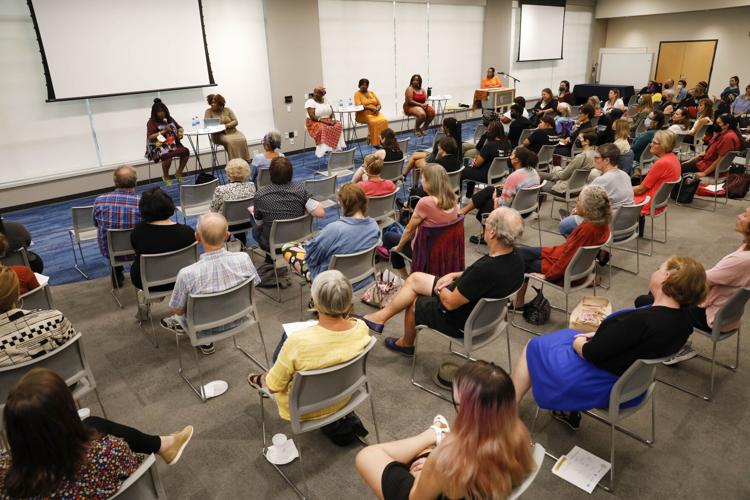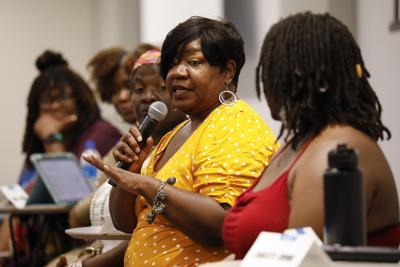In the wake of an ongoing controversy over the treatment of artist Lilada Gee at the Madison Museum of Contemporary Art, Gee and four other Black women artists talked Tuesday evening at Madison College’s Goodman South Campus about what the city needs to do to be more inclusive and safe for artists of color.
Gee, Grace Ruo, Sonia Valle, Catrina J. Sparkman, and Fabu Phillis Carter formed the panel that was moderated by Charlotte Cummins.
The panel was sponsored by the Madison Arts Commission, Friends of the Madison Arts Commission, and Seein is Believin.
A central theme during the panel was the climate of racism and insensitivity surrounding the Madison Museum of Contemporary Art over the past several months, as well as other incidents the artists have personally faced in Madison.
“I think what brought me out was the fact that there are other Black women who are here who are gonna be expressing their experiences and I wanted to be a part of that supportive community,” Gee said.
Critics believe MMoCA has largely refused to take responsibility for its mishandling of a June incident where Gee’s artwork was stolen, defaced, and disrespected by a woman and her young children. MMoCA described 16 minutes where security was not watching over exhibits as “a brief lapse.”
Theft and vandalism are criminal acts but MMoCA went to lengths to avoid involving the police in the incident, even going as far as to ask Gee if it was okay for the woman and the children to keep the exhibit they had vandalized and stolen.

Fabu Carter, Catrina Sparkman, Sonia Valle, Lilada Gee and Grace Run speak about their experiences as artists with being both supported and unsupported by the community during the Black Women Artists Speak panel at Madison College Goodman South Campus on Tuesday, Sep. 20, 2022.
“This summer I interned at MMoCA,” Ruo said. “I was so ecstatic to be there at a time they were supposedly uplifting Black women’s voices. On June 24, theft and vandalism of Lilada’s work occurred. I thought, ‘Okay, we’re gonna talk about it.’
“And there was nothing… I didn’t feel safe or supported in that museum, or even encouraged, and it was very heavy to sit with.”
MMoCA’s non-response to the incident prompted artists of color to question the museum’s racial sensitivity and begin to pull their exhibits from the museum. A group of UW art students and faculty joined Black women artists in calling for the resignation of MMoCA director Christina Brungardt.
The museum said last week it will hire a “visual anthropologist in residence” to look into “incidents that occurred” during the Triennial. That person, the museum wrote, will be “looking toward the future and exploring ways to address institutional racism within MMoCA and root causes of this particular conflict,” including those that “predate a majority of members of the current board and staff.”
“I didn’t know that in 2022 I would be actively witnessing whitewashing,” Ruo said. “I am appalled by the actions of the Madison Museum of Contemporary Art.”
There was very little representation from MMoCA’s board of directors. Only two or three members of their board showed up to Tuesday’s panel and MMoCA did not sign on as a supporter of the event.
“I’m a board member,” said Hedi Rudd, director of south Madison programs at Rooted. “I’m sad that this is here. I don’t see MMoCA anywhere here as a supporter. It makes me so sad that this is Madison. We’re so smart but we can’t have conversations with people? That’s gross.”
Gee, for her part, is tired of talking about the things that happened at MMoCA because she believes it is clear the museum has no interest in supporting Black woman artists.
“Why do you all want us to continue to tell our pain to deaf ears?” Gee said. “If an MMoCA board member doesn’t know what they are dealing with at this point in time, I can’t imagine what language you need me to say to you for you to understand.”

Suckers wrapped in “MMoCA sucks” labels were handed out at the Black Women Artists Speak panel at Madison College Goodman South Campus on Tuesday, Sep. 20, 2022.
Gee asked the audience how many white women artists were in attendance. A multitude of women raised their hands. Gee asked them how many of them had gone through incidents like hers or faced such obstacles. All of the white women put their hands down.
“If you leave this room and say now I know how to support Black women artists, you’re lying,” Gee said. “You know how to support artists. You know who you give wall space to. How many of you have had to deal with trauma and attack for your art? So, Madison knows how to support artists. Does the fact that I’m Black mean that you don’t do that for me?”
Each panelist shared horrifying stories of incidents they have faced.
Valle spoke of a professor tearing illustrations she had carefully drawn to shreds right in front of her, leaving her in tears.
“I walked out crying because I did not feel like my drawings deserved that,” Valle said. “To me, that was the experience I had.”
Sparkman recounted teaching a class at the University of Wisconsin-Madison called Theatre for Cultural and Social Awareness. She said that a pair of Trump-supporting white male students came up to her to confront her about her “behavior” of not liking their opinions. Sparkman said she was alone in the classroom at the time and the two students were blocking the door.
“They were saying I was oppressing them as white males,” Sparkman said. “They began to stand in the doorway and tried to keep me from leaving that space. It was just the hand of God that caused that situation not to go badly.”
Sparkman said that the university's response fell short of the mark. The dean of students removed the two students from her class but not from the overall theater program, and Sparkman had to watch as one of the students was ultimately cast in a leading role in a play. She said the chair of her department never reached out to her or contacted her to ask what happened or how she was.
“The chair never spoke a word about it,” Sparkman said. “Two years later when the conversation arose about me becoming permanent in the position, this chair spoke up and referred to this incident saying this was the reason I should not be given the permanent position.”

Black Women Artists Speak panelist Fabu Carter (left) listens as Catrina Sparkman (right) recalls a time when her theater students threatened her. The panel, which took place at Madison College Goodman South Campus on Tuesday, Sep. 20, 2022, was formed following an attack on Gee’s artwork at Madison Museum of Contemporary Art.
Empowerment, joy and creativity
Fabu Phillis Carter wanted the panel to provide an opportunity for artists to have a safe space to talk about those bad experiences but also wanted to use it as a platform to reach young people who might be watching.
“First of all, I want young people to know they can be creative too,” Carter said. “I want them to be able to make a living off of it. I want them to know it is an honorable profession to be an artist and that everybody can’t fit the same mold, but if this is their purpose in life, I’d love them to pursue it.”
Carter began writing poetry as a child because, frankly, it was easier to write short-form things than attempt to be a novelist.
“I wanted to be a novelist,” Carter said. “And then my teacher would take a red pen and mark it up! So, I decided to try poetry as a way to express myself and I’ve just been a poet ever since. I love being called Poet Fabu. I see the world through a poet’s sensibilities and that’s how I interpret life.”
Youths from the Simpson Street Free Press were in attendance at the panel, and said afterwards they were inspired by the artists.
“I love poetry and I just feel empowered,” said Hannah E., a senior at Monona Grove High School, who took time after the panel to personally meet both Carter and Ruo. “Talking to Grace and hearing what Fabu said about culture is nice considering that I really like writing poetry and I would like to get into spoken word.”
Each of the panelists believes that inspiring youths through art is important but that it’s also vital to telling the stories of local Black history and culture.
“My art represents my culture,” Valle said. “It celebrates who I am and honors my ancestors. I’m thinking of commissioning more people to have space to exhibit our work and have our voices heard. We need a space for our work.”
Carter echoed the need for space.
“You’re not going to be able to tell the complete history or herstory of Wisconsin without the art of Black people,” Carter said. “We’ve been here for hundreds of years. We need acknowledgement and to be valued. It’s not going to be a full authentic history unless everyone who lives in Wisconsin is honored and valued too.”










